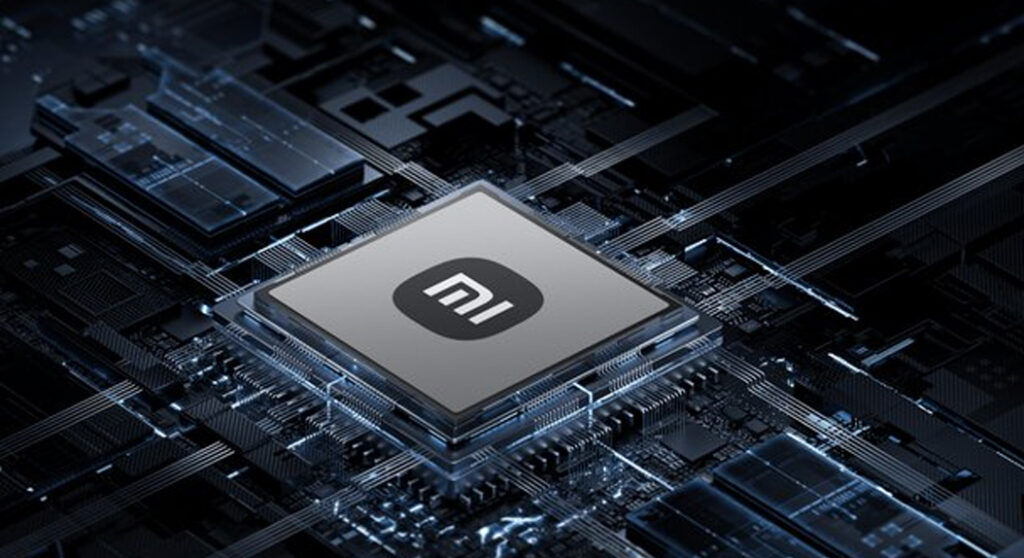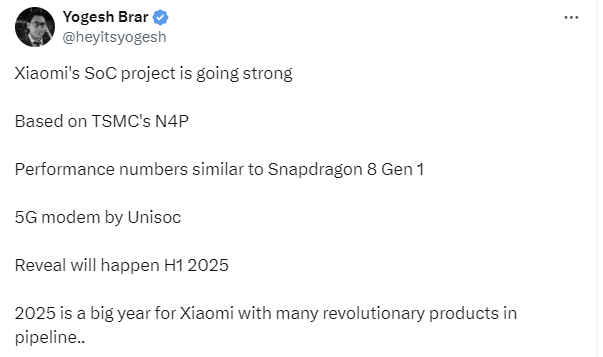Yesterday, the technology blogger Yogesh Brar published a blog post where he leaked the exciting new information about Xiaomi’s plans to make its chip for mobile phones. If this information is believed, the new chip is to be made on TSMC’s N4P process technology, the second 4nm-generation technology. Reportedly, the performance level of the new chip reaches Qualcomm’s Snapdragon 8 Gen 1, which in itself is a serious achievement for Xiaomi as it tried its own hand in designing chips.
Key features of the new Xiaomi’s chip
- Manufacturing Process: The chip is in the making on the TSMC N4P process. TSMC, the abbreviation for Taiwan Semiconductor Manufacturing Co., is one of the prime foundries working around the globe and is esteemed for its advanced technologies in that field. N4P is an improved version of TSMC’s 4nm process that improves performance and energy efficiency.
- “Aberrational” Performance: The new Xiaomi chip is said to offer performance that will put it in the same category with Qualcomm’s eight-Gen 1 Snapdragon chip introduced in mobile 2021 holidays—this level of performance suggests that Xiaomi’s chip could be used in flagship devices, providing powerful computing capabilities.
- 5G Connectivity: It will add a 5G baseband from Unisoc, the Chinese semiconductor company always known for mobile processors and modems. The fact that Xiaomi would turn to Unisoc for a 5G baseband suggests it wants to ensure the connectivity and network performance cannot easily be argued with in its handsets moving forward.
Expected Launch Timeline
In addition, the new Xiaomi chip is expected to make its debut in the first half of 2025. That would also fit with the broader strategy by Xiaomi to become more vertically integrated-similarly to other big cellphone makers, like Apple and Samsung, which also design their own chips.
Background and Strategic Importance
This was not the first time rumors began doing rounds regarding Xiaomi developing its own chips. In February, that Xiaomi was actually involved in bringing forward its standalone application processor (AP) by working closely with ARM – this chip forms the brain of a portable device and incorporates, among other functionalities, the CPU, GPU, and sometimes the modem.
With an in-house-designed chip, Xiaomi has better control over hardware-software integration. It may further help better the performance of the device, efficient use of the battery, and roll out features that are unique to differentiate their smartphones from the rest. It will also reduce dependency on other third-party suppliers, namely Qualcomm and MediaTek, thus providing better control of the supply chain and cost-related issues for Xiaomi.
Implications for the Smartphone Market
It may have pretty large consequences for the market if Xiaomi’s new chip really performs the way it is said to be. Find a way to make use of TSMC’s cutting-edge process—the N4P—and perform almost as well as Snapdragon’s high-tier chipsets, and Xiaomi would be nicely positioned to sell high-performance devices at compelling prices. All this further emphasizes Xiaomi’s position in the global smartphone market, in particular in those segments where end customers are looking for high performance and value. Conclusion Xiaomi is also in the chip business in a way, but all is still in the factory. This chip is another derivation of the MI Verge, so fans keep their eyes open in 2025 as they wait for how this new technology will be incorporated into other devices.


 Emir Bardakçı
Emir Bardakçı



So far, in real life, having a “own” chip does NOT mean lower prices, quite the opposite 😅.
The CEO’s or other manager’s response is … do you know how much 💰💰💰 we spent on R&D … 🤷🏻♂️.
Welldone plz…yes ! Considering the global specs certificate as requested smartphone specification or certification is always maintained as good terms of services under the chip design certificate or otherwise regards the bests of chip flagship certification…so exactly to allow special chips under strict right reserved terms for different phone specification terms indeed as true confidential info. with due respect for strict select terms or really other special selection terms,…hence the corresponding situation as chips design and flagship terms- certificate is actually achieved for different special chips with good specification or specialization terms rather…thanks so much, best wishes !